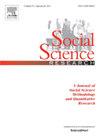晚年护理和健康的动态。来自生物标志物数据和认知测试的见解
IF 3.2
2区 社会学
Q1 SOCIOLOGY
引用次数: 0
摘要
随着人口老龄化和非正式护理变得更加普遍,提供护理的健康后果正成为社会关注的一个关键问题。社会学理论的压力评估和角色应变假设有害的后果,健康和福祉的照顾者。相反,角色增强理论认为,照顾可以对健康产生积极的影响。利用英国老龄化纵向研究(ELSA)收集的数据,在50岁或以上的成年人中进行了长达20年的随访(2002 - 23,88225次观察,20,217名受访者),我们研究了进入和退出照顾之间的关系,以及作为照顾后果尚未得到充分研究的两个关键健康结果,即:适应负荷和认知功能。我们估计了不对称固定效应模型,该模型将健康结果的变化作为进入和退出护理的函数,同时考虑到未观察到的人与人之间的异质性。我们的研究结果表明,照顾与男性和女性更好的认知健康有关,但与改善基于生物标志物的适应负荷无关。结果不会因护理强度而有所不同。我们的研究结果为角色增强理论提供了支持,表明照顾者在认知功能方面受益,即使基于生物标志物的方法来测量压力相关的健康结果并不能证实整体健康益处。我们提出了政策制定的意义和未来的研究方向。本文章由计算机程序翻译,如有差异,请以英文原文为准。
Dynamics of later-life caregiving and health. Insights from biomarker data and cognitive tests
As populations age and informal caregiving becomes more widespread, the health consequences of providing care are becoming a key concern for societies. Sociological theories of stress appraisal and role strain posit detrimental consequences to the health and wellbeing of caregivers. Conversely, role enhancement theory holds that caregiving can have positive health consequences. Using data from the English Longitudinal Study of Aging (ELSA) collected among adults aged 50 years or older with a follow-up period of up to 20 years (2002–23, 88,225 observations of 20,217 respondents), we examine associations between transitions into and out of caregiving, and two key health outcomes which have been understudied as consequences of caregiving, namely: allostatic load and cognitive functioning. We estimate asymmetric fixed-effects models which model changes in health outcomes as a function of transitions into and out of caregiving while accounting for unobserved between-person heterogeneity. Our results show that caregiving is associated with better cognitive health for both men and women, but not with improved biomarker-based allostatic load. Results do not differ by caregiving intensity. Our findings provide support for role enhancement theory, suggesting that caregivers benefit in terms of cognitive functioning, even if a biomarker-based approach to measuring stress-related health outcome does not corroborate an overall health benefit. We formulate implications for policy-making and directions for future research.
求助全文
通过发布文献求助,成功后即可免费获取论文全文。
去求助
来源期刊

Social Science Research
SOCIOLOGY-
CiteScore
4.30
自引率
4.00%
发文量
0
审稿时长
65 days
期刊介绍:
Social Science Research publishes papers devoted to quantitative social science research and methodology. The journal features articles that illustrate the use of quantitative methods in the empirical solution of substantive problems, and emphasizes those concerned with issues or methods that cut across traditional disciplinary lines. Special attention is given to methods that have been used by only one particular social science discipline, but that may have application to a broader range of areas.
 求助内容:
求助内容: 应助结果提醒方式:
应助结果提醒方式:


